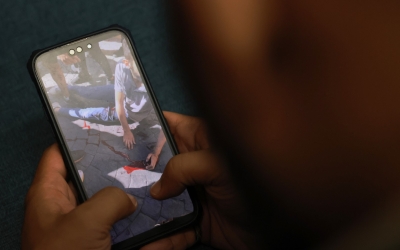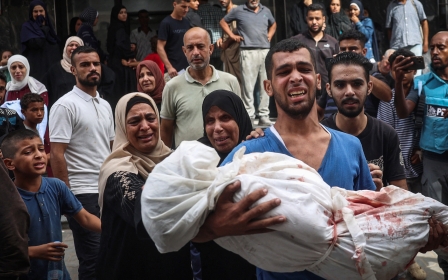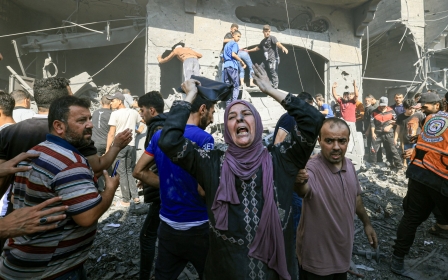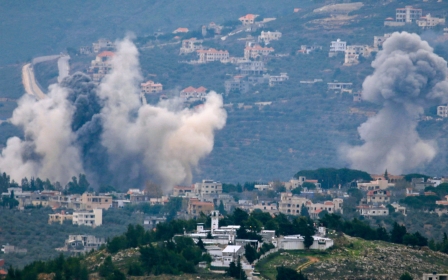Israel's war on Lebanon: The trauma of watching the 'Hollywood movie' from afar
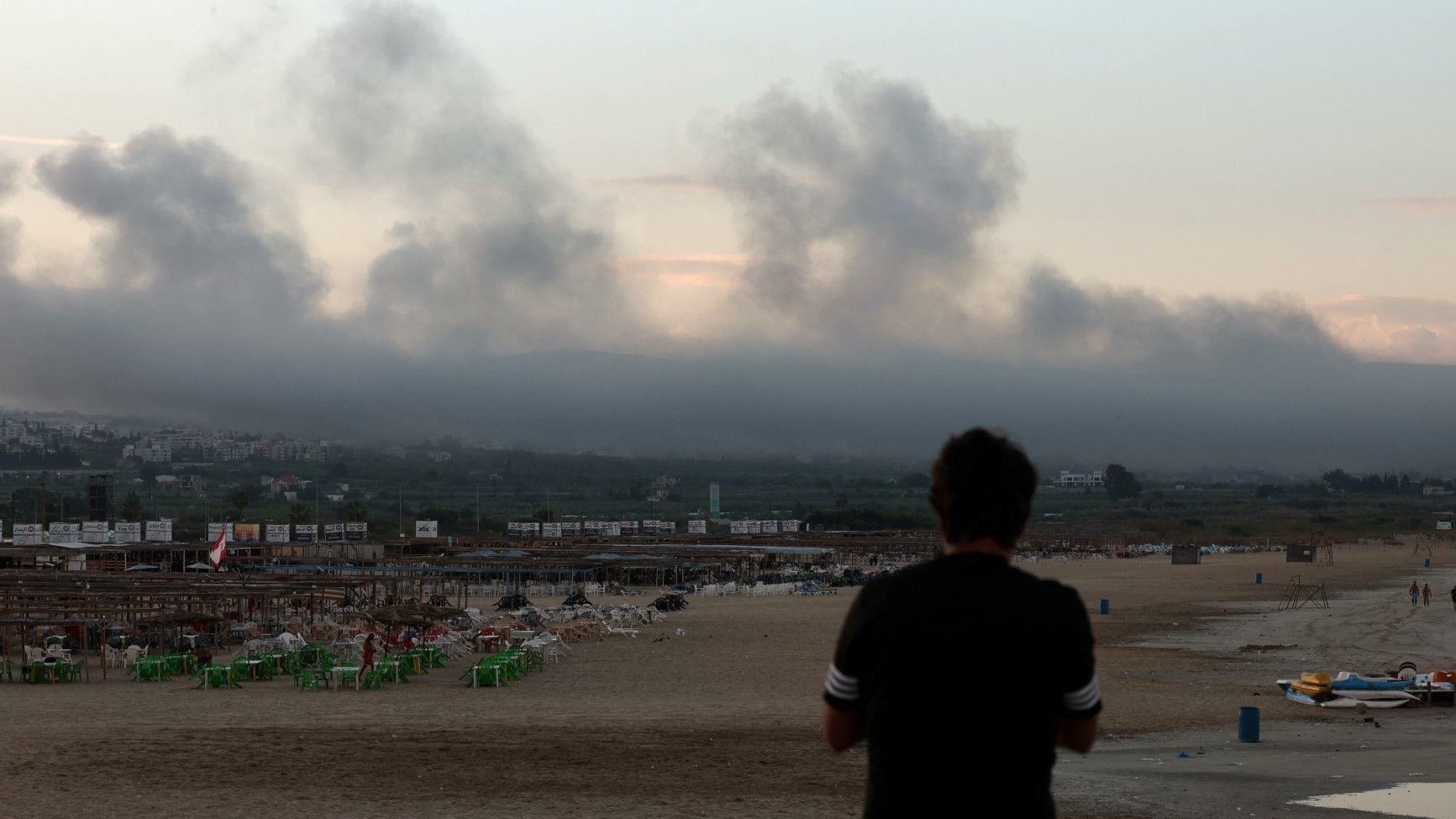
I’m having my morning coffee in Montreal when I receive the news.
My friend Rami forwards a WhatsApp message. In Arabic, it reads: “Ouzai, Ghobeiri, Sfeir, Haret Hreik, Saida, pagers are exploding. A breach. They’ve hacked into devices and phones and exploded them. Lots of contradictory information. Some 500 explosions so far.”
In Beirut, it’s just after 3:40 pm.
There is no need to ask who “they” are. It is the same “they” who have been decimating and starving the Palestinians of Gaza for almost an entire year now, who have bombed hospitals and refugee camps, who have raped prisoners and then, when chastised, rioted for the right to rape prisoners.
The “they” who are on trial at the International Court of Justice for the crime of crimes, genocide, and who have otherwise breached, on camera, any number of the so-called red lines of international humanitarian law.
New MEE newsletter: Jerusalem Dispatch
Sign up to get the latest insights and analysis on Israel-Palestine, alongside Turkey Unpacked and other MEE newsletters
After all of that, I shouldn’t be surprised at anything “they” might be capable of, nor how the world will excuse it.
Still, I start receiving videos and I can’t believe what I’m seeing. CCTV footage from grocery stores, with explosions going off at people’s waists or in their hands. Streets crowded with ambulances and shouting people. Men on gurneys, the shredded leftovers of their hands gushing blood.
The most absurd thing is how no western headline called this textbook act of mass terrorism by its name
What is this dystopian nightmare? How did they hack into people’s devices? And what devices are vulnerable?
I try to remember where I bought my phone. Was it from a cellphone place in Beirut, the kind where explosions are now going off as the merchandise ignites? Or did I order it directly from abroad? Is it safe or suspect?
No matter: I have to pick up my phone, this potential murder weapon, to reach my friends and family, to make sure they’re OK, forcing them to pick up a potential murder weapon to answer.
'Hezbollah pagers'
This device used to connect us is now the very thing that makes us afraid to connect. Does the level of paranoia seem absurd?
Not as absurd as several thousand small explosions going off across Lebanon in a single day, then several hundred more the next.
Follow Middle East Eye's live coverage of the Israel-Palestine war
Before the details became clearer - that these devices, including pagers, walkie talkies and solar panels that exploded over the course of two days, killing 39 and wounding over 3,250, had been intercepted and planted with explosives by Israel, not hacked - the terror of common household electronics reached such a level that people were rushing around their households disconnecting UPS batteries and turning off baby monitors.
The most absurd thing, however, is how no western headline called this textbook act of mass terrorism by its name. Instead, they called these 4,000-plus explosions “targeted attacks”, and they called these devices, used by doctors, deliverymen and countless other professionals, “Hezbollah pagers”.
Four-thousand-plus explosions, which took place across the country over the course of two days, igniting against the vulnerable intimacy of people’s bodies, with some of those people young children, or at home with young children, or in grocery stores or pharmacies or driving on highways, their cars suddenly careering out of control.
Hospitals across the country were overwhelmed, seeing an influx of wounded greater than during the 4 August 2020 Beirut Port explosion, with trauma surgeons describing injuries “unlike anything they had seen before, mainly wounded eyes and hands, a result of patients looking at their pagers before they exploded”.
This tactic of unparalleled sadism, designed to result in life-altering injuries, was heeded as “brilliant” and described as one of “targeted precision”.
Faceless brown hordes
Not only did western media refuse to call this terrorism; it was hardly able to contain its thrill at the spectacle.
Even outlets that ran stories mentioning the suffering of Lebanese civilians, or the overwhelming of the health sector, ran them alongside other articles breathlessly extolling the “audacity” and “sophistication” and “eye-catching demonstration of Israel’s technological prowess”.
Countless pundits on social media likened it gleefully to a Hollywood movie. They’re right. But it’s not the “spycraft” that makes it akin to a Hollywood movie. Rather the fact that there are faceless brown hordes who can be mowed down without a second thought, killed en masse to the triumphant cheers of the audience.
Those murdered are not individuals who, like every individual, is a single star in a constellation of relationships, and whose passing alters the very gravity of their surrounding patch of the universe.
No, they are “extras”, who don’t even merit any mention in the credits, and whose deaths don’t go simply unmourned but outright celebrated. This is the political reality that not only Hollywood, but that western media reflects and maintains. One in which terrorism is a crime arbitrated not by the deed but the doer.
I’ve long been struggling to articulate to people, who don’t know it intimately, the vertiginous feeling of watching your country being devastated from abroad - the way the sense of helplessness is compounded by cognitive dissonance, with your body in one place, cocooned in the safety of one world while your awareness is hyper-focused on the terror of another.
Well-meaning people ask: “Aren’t you grateful you’re not there right now?” A question I find impossible to answer.
After all, I was just there, worried about whether the airport would close down before my flight left, commiserating with friends about the relentless anxiety, sometimes pitching up into the outright terror we’ve been living with since October.
Stark choice
I would be lying if I didn’t say that I’m grateful for my safety. I would also be lying if I didn’t say that I wish I was back in Beirut.
Because now that I’ve been forced, for the first time in this war, to look at its events primarily through the distorting filter of the western media, it’s become easier for me to articulate what’s so difficult about being away.
The cognitive dissonance of being in the West while the East burns isn’t simply that misalignment between where your body is and where your mind’s at. It’s being in a place whose every venerable institution insists that this burning is right and good, no matter how barbarous or savage.
There is nothing more dissonant than having the sanitised language of the western media exist between me and the visceral experience that I know people over there are going through.
No one is faceless or expendable; no one is without a past or loved ones. Even the damaged stones have histories
At least when I’m there, no one’s humanity is in question - including my own. I’m not alienated from any feeling I might be having, neither fear nor anxiety nor even, in fact especially, sorrow.
All of it is mirrored and affirmed by the surrounding world. No one is faceless or expendable; no one is without a past or loved ones. Even the damaged stones have histories. There is so much mental relief in this that one is often tempted to exchange it for physical safety.
And there is absolutely no let-up from this dissonance on the horizon.
In the day since I began trying to put words to the horror of these latest events, Israel carried out a “targeted air strike” in the Beirut suburb of Haret Hreik, collapsing two residential buildings, killing 45, wounding 66, and making regional war seem ever-more inevitable.
On Monday, we've entered into full-blown war, with the south and west of Lebanon especially being decimated. The casualties are enormous: already 274 murdered and 1,000 injured.
Israel is speed-running the Gaza playbook, bombing ambulances, the paths to hospitals, ordering people to "evacuate" and then bombing the roads that might allow them to do so. Meanwhile the weapons continue to flow.
And the excuses have already been made -and accepted- as they have been for a full year.
Just as everyone in Gaza is Hamas, everyone in Lebanon is Hezbollah and thus fair game.
The nightmare we've all been anticipating for an entire year has come to pass. A nightmare that anyone could see coming, that could have been stopped at any time previous to this.
I’m unable to do anything but watch the news, and I don’t know when - or if - I’ll be able to go back home to Beirut.
For those of us lucky enough to even have it, the choice is a stark one. As a dear friend who’s been living in the US for some years now puts it: “I’m either in the flames or I’m in the place lighting the fire.”
The views expressed in this article belong to the author and do not necessarily reflect the editorial policy of Middle East Eye.
Middle East Eye delivers independent and unrivalled coverage and analysis of the Middle East, North Africa and beyond. To learn more about republishing this content and the associated fees, please fill out this form. More about MEE can be found here.



